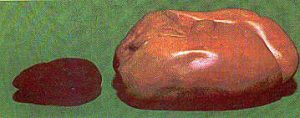-
Adopt
-
Veterinary Care
Services
Client Information
- What to Expect – Angell Boston
- Client Rights and Responsibilities
- Payments / Financial Assistance
- Pharmacy
- Client Policies
- Our Doctors
- Grief Support / Counseling
- Directions and Parking
- Helpful “How-to” Pet Care
Online Payments
Referrals
- Referral Forms/Contact
- Direct Connect
- Referring Veterinarian Portal
- Clinical Articles
- Partners in Care Newsletter
CE, Internships & Alumni Info
CE Seminar Schedule
Emergency: Boston
Emergency: Waltham
Poison Control Hotline
-
Programs & Resources
- Careers
-
Donate Now
Foie Gras Force-feeding Physical Effects Psychological Effects Fun Facts
Foie Gras Production
In French, “foie gras” literally means “fatty liver.” Force feeding ducks and geese two to three times per day artificially enlarges their liver to achieve the rich, fatty taste that is coveted in the food industry. Production of foie gras is universally considered one of the most abominable practices in farming due to its inherent cruelty.
Force-feeding
Foie gras comes from domesticated geese or ducks (ducks are more commonly used). The vast majority of birds raised for foie gras are confined to individual cages the size of shoe boxes, the rest are confined in groups in small pens. The only interaction the birds have is with a human who, two to three times daily, grabs the neck of each bird and inserts an 8–12 inch long metal pipe through their throat and esophagus. The birds are force fed 1/4–1/3 of their own body weight, the human equivalent of being force fed 44 pounds of pasta a day. The liver of the birds is increased seven to ten times its normal size before they are slaughtered. It is this fatty, diseased liver that is so highly revered for culinary purposes.
Physical/Behavioral Effects
The practice of force feeding causes suffering to geese and ducks. Evidence gathered from scientific research, veterinary analysis, observations at foie gras farms, and necropsies, document the physical, social, and behavioral impacts of force feeding on birds.
The force feeding often results in physical injuries such as a lacerated trachea and esophagus. Force feeding causes liver steatosis, meaning the liver is no longer able to work as a circulatory filter. This malfunctioning of the liver often results in damage to the central nervous system. The enlargement of the liver also impairs breathing as the liver squeezes the air sacs of the lungs, causing constant panting in ducks raised for foie gras. The enlarged liver also causes extreme weight gain, making it difficult for the ducks to walk. All this creates a mortality rate that is up to 20 times higher on foie gras farms than on conventional duck farms.
Psychological Effects
Birds kept for foie gras production are confined in cages and live in constant darkness. They are unable to express any of their natural behaviors and instincts. Both ducks and geese are extremely social animals; their individual confinement does not allow for any of the natural stimulation they receive from social interaction.
Confinement also makes them unable to fly and swim, as they are only given enough water to stick their bill in, at best. Birds are debilled, a process where their upper bills are cut off. Similar to debeaking in chickens, the debilling process is extremely painful for birds as bill tissue is rich in nerve endings. Bills also provide birds with important sensory feedback, so debilling prevents birds from expressing natural behaviors.
What Can You Do?Polls in various U.S. cities and states consistently showed 75%–80% public support for a foie gras ban. Sixteen countries prohibit the force feeding of ducks. Chicago banned the production and sale of foie gras in the past; however, the Chicago ban was unfortunately later repealed. California passed a ban that survived a legal challenge and paved the way for other jurisdictions to adopt similar measures. On October 30, 2019, the City Council of New York City voted to ban foie gras by 2022.
Do you know of a restaurant that serves foie gras in your town? Educate them on the cruelty involved in foie gras production and ask them to stop offering foie gras on their menu.
Did you know?
- Geese and ducks love bathing and playing in water.
- Ducks and geese can fly as much as 332 miles a day.
- Geese have exceptional eyesight and a wide field of vision.
- A male duck is called a drake, a female is called a duck.
- One way to tell a male from a female duck is that females make a loud quack while drakes have a raspy quieter quack.
- Ducks are gregarious, social animals who like to hang out in large groups with other ducks.
- Baby ducks are precocial, meaning they are not completely dependent on their parents for food.
- Geese mate for life and are very protective of their partners and offspring.
- Geese can travel thousands of miles during their yearly migrations. They fly in a characteristic V-shape to reduce wind resistance and conserve energy. They rotate from the front to the back when they get tired.
- Toulouse geese are the type of geese used in foie gras production. The breed specifically is known for its trusting nature and docile personality.





